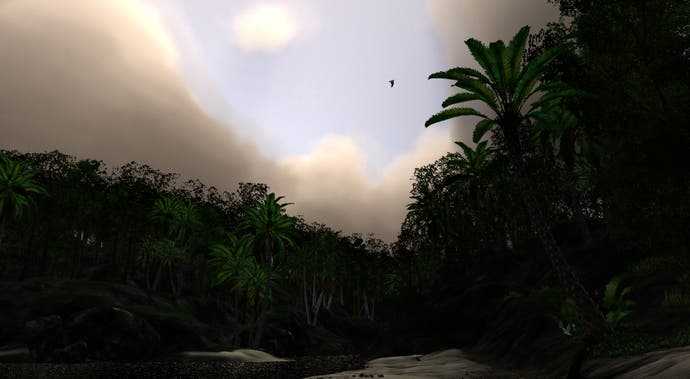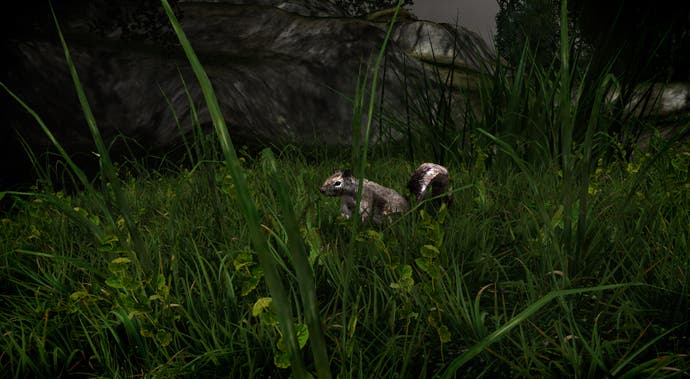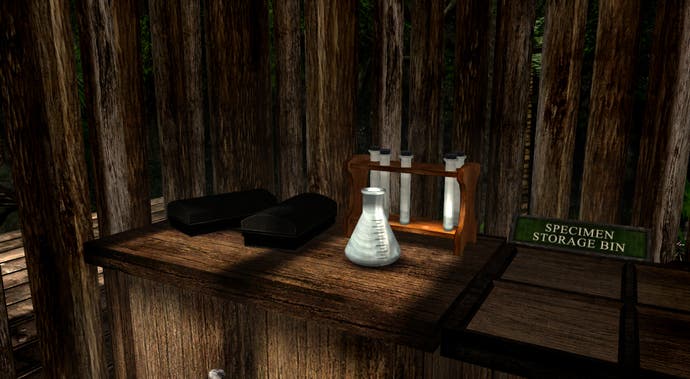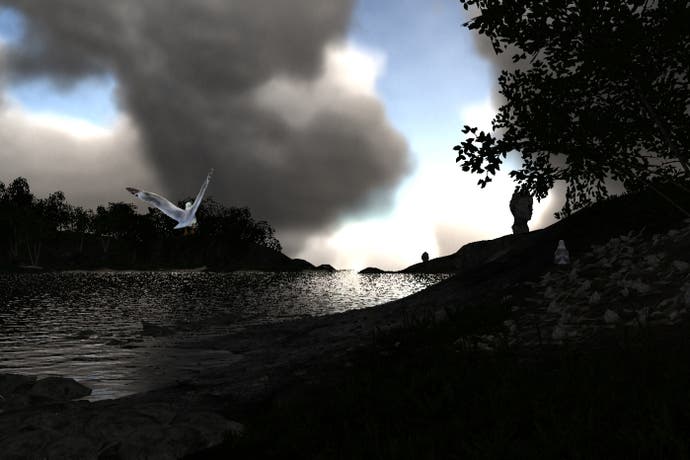Miasmata review
Aah, aah, aah, aah, stayin' alive.
Games have a habit of distorting language. Take the word “survival”, for instance. Maybe it makes you think of survival horror, a genre that is different from standard horror in only most hair-splitting semantic ways. Perhaps it calls to mind the idea of a survival mode, in which you gun down waves of enemies in the shooter of your choice. Again, you're only really doing what you'd be doing anyway. Survival in games is always on the agenda. In Miasmata, however, survival is the only item on the agenda.
First-person adventure game would be the obvious genre box to shove Miasmata into, but it's an imperfect fit. Certainly it starts with the brusque clarity of an early text adventure. You are Robert Hughes, a scientist infected with the very same deadly disease you've been working to cure. Returning to the remote island where your colleagues are working, you discover the outpost abandoned, the researchers missing or dead.
From this starting point, everything else is up to you, even though every decision you make will be informed by the infection that is slowly killing you. Your movement is slow and uncertain. You lack the strength to swim for long distances and dropping more than a few feet onto solid rock is a good way to crack your skull. You'll stagger when walking over loose rocks or uneven terrain, and in your delirium you'll sway and stumble forwards rather than stopping with the precision of an arcade avatar.

It's understandable, then, that survival is pretty much the only thing on your mind. You'll need to regularly drink fresh water to keep your fever down and your symptoms can be abated for longer by creating medicines from the flowers and plants growing across the island. In keeping with the game's stern tone, crafting is more complex than simply mushing red and green herbs together in your inventory, however.
One of the first buildings you come across is an abandoned lab. Here you can use the equipment to analyse any new flora that you've found, work out its properties and then synthesise it into something that will keep you alive for longer. That task is easy compared to actually foraging for the plants in the first place, though. That means getting out into the wild, poking around and risking life and limb with every step. You have a map and compass but, once again, navigation is not as simple as it is in other games. Here you must use landmarks to triangulate your position in order to fill in the map.
Also complicating matters is the large carnivorous feline creature that calls the island home. Cross its path and it will hunt you relentlessly, sniffing you out, stalking you from the undergrowth with its fiendish AI and feasting on your sickly flesh with no mercy. From the first moment you encounter this beast, its presence lends a permanent undercurrent of urgency and terror to a game that was hardly relaxing to begin with.
"Exploration is terrifying and fraught with danger, yet it's something you are absolutely and constantly compelled to do."

Everything is dangerous. Everything is necessary. If Miasmata boasts one overwhelming success, it's the way it establishes those stakes. Exploration is terrifying and fraught with danger, yet it's something you are absolutely and constantly compelled to do. Purely from a dramatic standpoint, it's a brilliantly cruel and concise set-up.
The immersion that Miasmata offers is a delicate construction, however, and one that the game's rough edges too often undermine. A lack of polish is understandable in any indie project - Miasmata developer IonFX is just two people, brothers Joe and Bob Johnson - but too often the wobbles actively impact the gameplay.
The game engine itself - developed entirely by Joe - is capable of offering some truly lovely vistas, but also some awkwardly clumsy moments: water pours from jugs as a series of translucent blue balls, for example. While it's hard not to appreciate the effort, the game creaks and groans, textures pop in and out, the frame rate wheezes and it makes your PC chug for no apparent benefit.
More distracting still are the weird arms that float in from the bottom of the screen like balloon animals. Bringing back memories of Jurassic Park: Trespasser, these undulating appendages not only shatter the taut fiction that the game's concept so carefully creates, they make interacting with the environment distractingly inconsistent. Coming across a dead scientist, a knife sticking from his back, I spent several fruitless minutes crouching and shuffling around just trying to work out if I could actually take the blade in question, before my odd digital body wiggled its way into a position that triggered the context-sensitive action.

The game world, too, sometimes keeps you at a distance through illogical rules, such as knee-deep water that still forces you to swim to cross it, risking death by drowning. The research element, while fine in theory, ultimately boils down to a series of pre-rendered microscope and test tube animations rather than any real puzzle element.
So Miasmata is a brilliant idea, often hobbled by design that is by turns endearingly over-ambitious and flat-out wonky - but its ups outweigh the downs over the long haul. All indie games must make a deal with the player at some level, where the trade-off between polish and innovation is struck. Miasmata's ambition counts against it in many respects, but it still comes good on the deal in the end.
When its elements align correctly, it's one of the most intriguing and challenging first-person games in years: essentially a ruthlessly miminalist riff on Far Cry 3, if Jason Brody's ordeal had reduced him to a realistic quivering wreck rather than making him a voodoo-powered Rambo. Like its disease-wracked hero, Miasmata stumbles along the way, but is worth following all the same.

